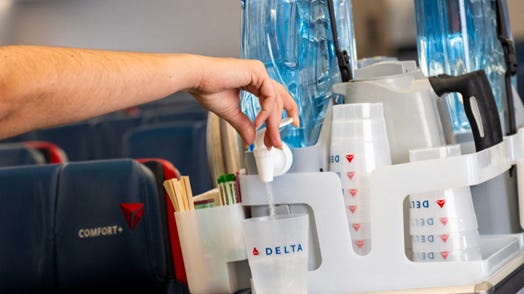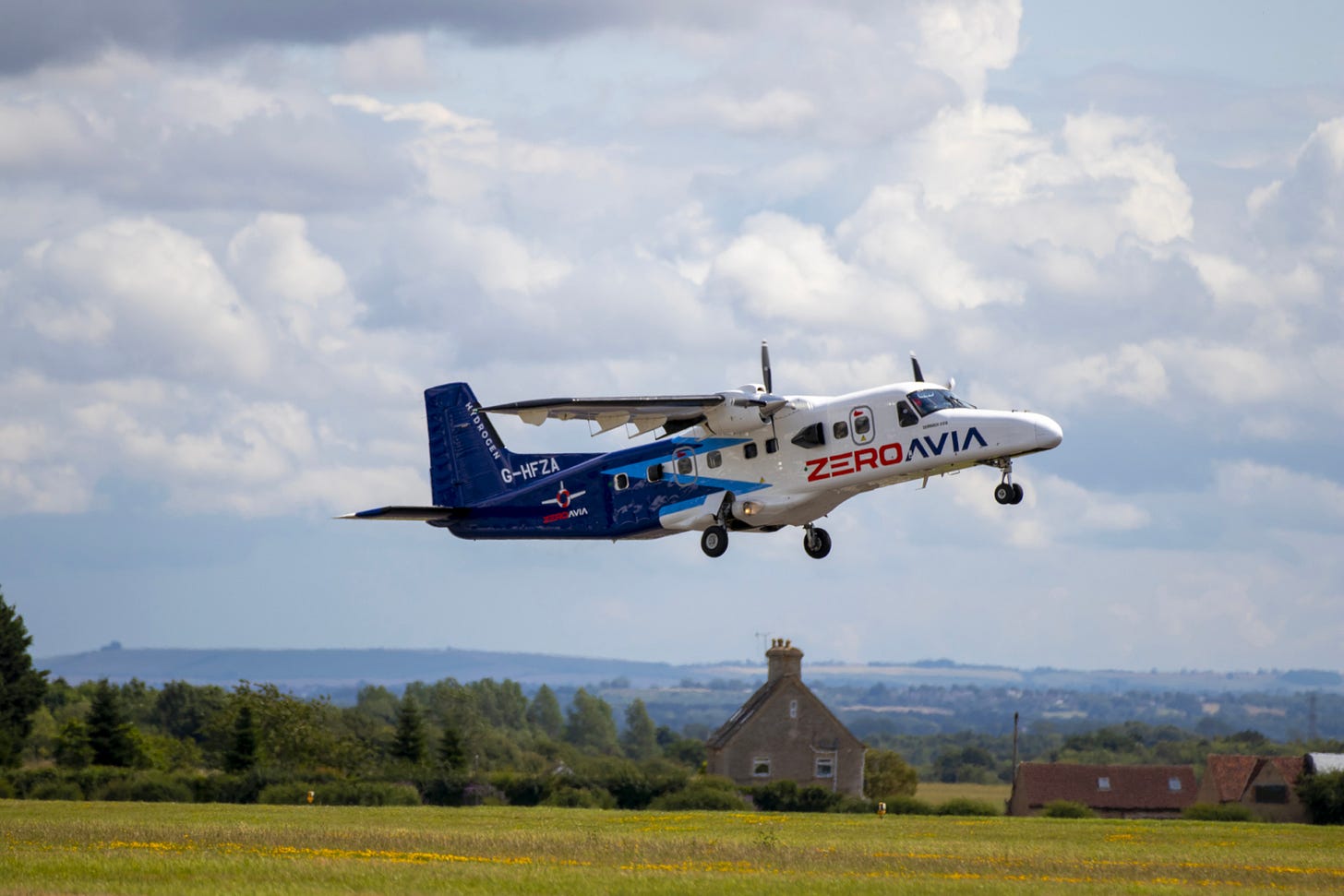#Sustainability20: Virgin & Rolls-Royce Set Date For World's First 100% SAF Transatlantic Flight & Other Stories In Aviation
Weekly Roundup - 21/07/23
Each Friday, we publish a round-up of the 20 most important stories on sustainable aviation. You can see previous editions of #Sustainability20 here.
Industry Updates
American Airlines' 2022 Sustainability Report outlines its goal to reach net-zero emissions by 2050 through fuel efficiency and sustainable aviation fuel. It also highlights its commitment to diversity, equity, inclusion, and safety. Recognition of the company's sustainability efforts includes inclusion in the Dow Jones Sustainability North America Index for a second year and being named 2023 Eco-Airline of the Year by Air Transport World.
The FAA is allocating over $90m to 21 US airports to aid in reaching net-zero emissions by 2050. The funds, a part of the FAA's 2021 Aviation Climate Action Plan, will support sustainability initiatives like solar energy and electric transportation infrastructure. This funding follows nearly $1bn in support from President Biden's Bipartisan Infrastructure Law.
The International Air Transport Association (IATA) and Atkins have created a digital toolkit for airports to calculate and reduce the carbon emissions from constructing terminal buildings, runways, and multi-storey car parks. These pioneering tools, applicable early in the design phase, aim to enhance understanding of construction-related carbon emissions and promote dialogue on carbon mitigation, assisting the aviation industry's 2050 net-zero goal.
Major energy companies are reversing climate commitments and expanding fossil fuel production due to profit motives, despite climate impacts. BP has reduced its 2030 emissions goal, ExxonMobil has abandoned a low-carbon fuel project, and Shell has halted increased investment in renewables. Experts suggest these climate commitments are strategic, aiming to evade regulation, and discarded when inconvenient.
London City Airport is contesting Newham Council's decision to deny its plan to extend Saturday operating hours, arguing that the move would generate jobs, stimulate economic growth, and enable new airline routes. The council had rejected the proposal due to potential environmental impact and local disruption.
Infrastructure and operational efficiencies
Emirates has introduced a meal pre-booking service for business class passengers on Dubai-London routes, enabling meal selection up to 14 days prior to flights. The move aims to enhance passenger experience, boost efficiency, and reduce food wastage. Depending on customer feedback, the service may be expanded to other routes and cabin classes.
Delta Airlines is trialling reusable cups on select flights as part of its commitment to reducing environmental impact. Challenges include ensuring the cups' weight, durability, and compatibility with a variety of beverages. Although limited, these trials represent steps towards broader adoption of eco-friendly practices, such as minimising single-use plastic and reducing carbon emissions.
Torino Airport has launched Italy's largest airport rooftop photovoltaic system, consisting of 3,650 modules. Expected to generate 1,585MWh of electricity annually, it can meet up to 12% of the airport’s yearly needs, and save 406 tons of CO2 emissions. This initiative is part of Torino's environmental sustainability roadmap, aiming for zero emissions well before 2050.
Sustainable Aviation Fuel (SAF)
Virgin Atlantic and Rolls-Royce plan the world's first 100% SAF transatlantic flight on November 28, 2023, from London Heathrow to New York JFK, with a Virgin Boeing 787 Dreamliner. This follows the successful ground test of SAF blend on a Rolls-Royce Trent 1000 engine.
In 2022, United Airlines both generated the most carbon emissions among US passenger airlines and sourced the most SAF. While United's direct emissions stood at 30.4 million metric tons, inclusion of regional affiliates increased this to 36 million metric tons. Despite this, United led in SAF usage, securing 3 million gallons.
Uniper and Sasol ecoFT are advancing the SkyFuelH2 project for SAF production in Sweden. The project, pending final investment decision, uses biomass and renewable hydrogen via Fischer-Tropsch technology to produce SAF. Construction may start in 2025, with SAF supply by 2028.
Despite Asia's luxurious airlines, environmental sustainability lags. Recent deals, however, have spurred SAF use, made from waste resources. Singapore is leading with a SAF pilot program. India also plans to mandate SAF use. Globally, US carriers lead in SAF purchases, motivated by policy incentives and abundant supply. Europe seeks a 70% SAF mandate by 2050.
Air China completed a low-carbon flight from Hangzhou to Beijing using 10% blended SAF, marking a key step towards sustainable aviation. This milestone illustrates the aviation industry's commitment to environmental sustainability and positions Hangzhou as a leader in green innovations.
New technology: Electric and Hydrogen
Green energy entrepreneur Dale Vince plans to launch Ecojet, the UK's first electric airline, with flights between Edinburgh and Southampton in 2024. Initially running on kerosene-based fuel, the planes will be retrofitted later with engines converting green hydrogen into electricity.
ZeroAvia completed its initial prototype ZA600 flight testing campaign, successfully performing a series of tests with its hydrogen-electric engine in a Dornier 228 aircraft. The engine matched the power of conventional fossil fuel systems, setting the stage for cross-country flights and further demonstration. The company aims to commercialise hydrogen-electric aviation by 2025.
Swedavia has announced that Heart Aerospace will use Malmo Airport as a testing facility for its ES-30 electric regional aircraft. The airport will build infrastructure to charge electric aircraft as part of the ELISE project. Heart Aerospace aims to commence commercial services with the ES-30 in 2028.
Joby Aviation has submitted all certification plans for its eVTOL aircraft to the FAA, marking a major milestone in its mission to launch a commercial air taxi service in the U.S. in 2025. The company has also completed its first production prototype and received a special airworthiness certificate from the FAA for flight testing. Joby plans to achieve FAA-type certification in 2024.
UK’s Cranfield Aerospace Solutions and Britten-Norman plan to merge and create the first OEM for hydrogen-powered zero-emission aircraft. Their multi-phase plan includes developing a nine-passenger demonstrator by 2024, a larger hydrogen-electric aircraft in Phase Two, an all-new regional airliner by the early 2030s, and an aircraft with up to 100 seats by the mid-2030s.
While hydrogen has the potential to decarbonise a third of the aviation sector, it is decades away from mass adoption. SAF will be key to achieving net-zero greenhouse gas emissions, with industry experts predicting that they will meet over half of the demand for zero-carbon aviation. However, cost remains a significant barrier.
'This Is Engineering Inc.' (TIE) has unveiled SHIFT Compson, an advanced autonomous air mobility (AAM) vehicle capable of vertical takeoff and landing (eVTOL). Designed to carry five people, SHIFT Compson targets a top speed of 330 km/h and a flight distance of over 280 km.







